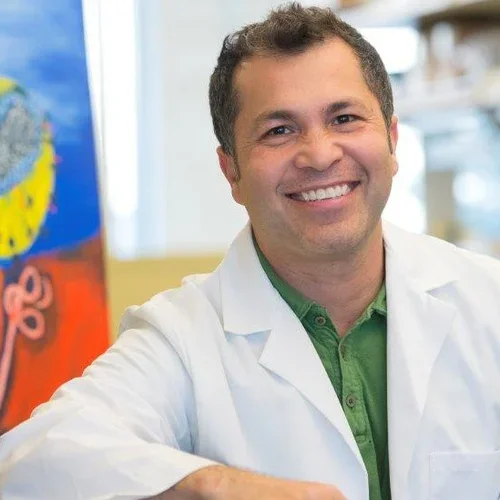
Hector Aguilar-Carreno
Department Chair and Professor, PhD
About
Research Interests:
The Aguilar-Carreno lab studies the seminal roles of viral glycoproteins in viral entry into naive host cells, viral assembly and egress from infected host cells, host immune responses key to vaccine development, and antiviral development. The lab specializes in viruses that are likely to cause pandemics, but our knowledge and research expands to endemic viruses.
1] Viral entry. Within the Paramyxoviridae family, Nipah virus (NiV) and Hendra virus (HeV) cause the highest mortality rates (40-100%) in humans. This viral family includes important human and veterinary pathogens, such as measles, mumps, human parainfluenza, canine distemper, and Newcastle disease viruses. There are many questions regarding paramyxoviral infections that remain elusive. Our recent studies identified several novel domains in the viral glycoproteins G and F that are important for modulating the viral-cell membrane fusion process during viral entry, as well as cell-cell fusion upon viral infection of host cells. We aim to understand the steps in the viral entry process that viral glycoprotein domains modulate. We use novel approaches that allow us to study viral entry steps such as receptor binding, fusion triggering, hemifusion, fusion pore formation, and syncytia formation on cells and on virions. Novel approaches include Flow Virometry and Raman Spectroscopy.
2] Viral assembly and egress. Using multi-omics approaches, we have identified cellular factors involved in viral entry, assembly, and budding out of infected cells. We are using this knowledge to study the mechanisms by which viral and cellular factors interact to modulate viral assembly and egress from infected host cells. Importantly, we connect this knowledge to the study of viral pathogenesis via established BSL-2, BSL-3, and BSL-4 research and collaborations. In addition, we use cryogenic electron microscopy (cryo-EM) to study the important structures of viral glycoproteins and their interactions with other viral structural proteins within viral particles using both viral-like particle (VLP) and full virion systems.
3] Immune responses and vaccine development. Viral-like particles (VLPs) are non-replication-competent units that resemble their respective actual virions. Our data has shown that NiV and HeV VLPs are useful to generate highly-neutralizing conformational antibodies to NiV and HeV. We investigate whether NiV and HeV viral-like particles and pseudotyped viral particles can be useful vaccine platforms to protect against NiV, HeV, and other emerging paramyxoviruses and other enveloped viruses such as coronaviruses and influenza viruses. We investigate broadly applicable new technologies to advance vaccine development to broadly protect against these viral families.
4] Antivirals. We take both empirical and targeted approaches. Our main interests include the search for antiviral agents with broad antiviral applications, with a special interest in those to be used against enveloped viruses. Our membrane fusion studies foster the discovery of broad-spectrum antivirals that target structural elements of enveloped viruses or their host cellular factors. We characterize the mechanisms of action of several families of broad-spectrum antiviral compounds.
Biography/Professional Experience:
Dr. Aguilar-Carreno (publication name Hector C. Aguilar) is a Professor and Chair of the Department of Microbiology, Immunology, and Molecular Genetics (MIMG) at UCLA. He received a B.S. degree in Biochemical Engineering from Instituto Tecnologico de Tepic, Mexico before immigrating to the USA. He obtained an M.S. degree in Biology from California State University, Los Angeles, and a PhD degree in Biochemistry and Molecular Biology from the University of Southern California, where he was introduced to viruses. He received post-doctoral training in Virology at UCLA, under the mentorship of Dr. Benhur Lee, and then became an Assistant Professor at the Paul G. Allen School for Global Animal Health at Washington State University (WSU). At UCLA he pioneered the identification of cell receptors for Nipah virus (NiV) and Hendra virus (HeV) and began to establish important tools to study NiV and HeV entry into mammalian host cells, as well as viral assembly/exit from infected cells. He has adopted technologies previously foreign to the field of Virology to study enveloped viruses, including Raman Spectroscopy, Super-Resolution Microscopy, and Flow Virometry. His studies on viral glycoproteins and their roles in host cell entry and viral assembly inform novel ways to develop broad-spectrum vaccines and antivirals. Dr. Aguilar-Carreno has served in many important scientific committees, including: Director of Graduate Studies of the WSU Immunology and Infectious Diseases PhD program; member of the WSU CVM Research Council; member of the WSU Internal Governance Board for NIH T32 post-doctoral program; member of the American Society for Virology (ASV) Education Committee; Ad-hoc member of ~20 NIH study sections; Standing Member of VIR-A and then MCV NIH study section; Chair of the American Society of Microbiology Committee for Minority Education; Chair of the American Society of Virology Diversity, Equity, and Inclusion committee; Chair of the Cornell CVM Diversity Committee; member of the Cornell CVM Research Council; member of the Cornell presidential postdoctoral fellowship committee; member of the BBS PhD Admissions committee, Director of the Cornell Program for Achieving Career Excellence (PACE), Chair of 16 PhD student thesis committees; member of >30 PhD student committees; and most recently President of the American Society of Virology, among other service roles.
Education and Degree(s)
BS, Biochemical Engineering, Instituto Tecnológico de Tepic
MS, Biology, California State University, Los Angeles
PhD, Biochemistry and Mol. Biol., University of Southern California